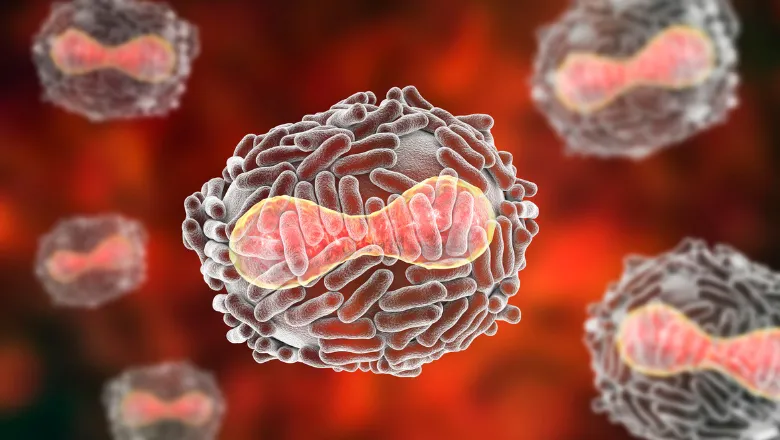Monkeypox has traditionally been considered a skin disease with respiratory complications. Our work shows that there are rare but severe neurological consequences that clinicians need to be aware of.
Dr Tom Pollak, NIHR Clinical Lecturer at King’s IoPPN, Honorary Consultant Neuropsychiatrist at South London and Maudsley NHS Foundation Trust, and joint senior author on the study.
21 September 2022
Monkeypox linked to neurological complications in some patients
New review of evidence finds monkeypox can lead to neurological complications.

The review, published in eClinicalMedicine, found that monkeypox can be linked to neurological complications such as encephalitis (brain inflammation), confusion or seizures in some patients. It provides the first comprehensive overview of the prevalence of neurological and psychiatric symptoms of monkeypox.
Across the studies with relevant evidence, 2-3% of monkeypox patients had severe complications such as seizure or encephalitis, although those studies mainly involved hospitalised patients from previous years. The researchers say there is not yet enough evidence to estimate neurological complication prevalence in the current monkeypox outbreak.
In some studies at least half of patients experienced at least one of myalgia (muscle aches), fatigue, headache, anxiety or depression, however the quality of the evidence was limited.
The team, led by researchers at the Institute of Psychiatry, Psychology & Neuroscience (IoPPN), South London and Maudsley NHS Foundation Trust and UCL, conducted a systematic review and meta-analysis of all studies reporting neurological or psychiatric symptoms of monkeypox that had been reported up until May 2022, before the outbreak spread globally.
Dr Tim Nicholson, Reader at King’s IoPPN and co-author on the study, said: “At present there is little data on how long these neurological and psychiatric symptoms persist for in monkeypox. Given that we now know that such symptoms can persist for months and even years after SARS-CoV-2 infections in Long COVID it is critical that clinicians and researchers monitor for and learn how to prevent or treat longer term consequences of other infections such as monkeypox.”
Monkeypox primarily causes skin lesions and fever, and can be fatal, however substantially fewer than one in 1,000 confirmed cases have resulted in death in the current outbreak, according to the World Health Organization (WHO). While it has been endemic in parts of Central and West Africa for decades, with sporadic outbreaks elsewhere, 2022 has been the first time the virus has spread globally, attracting increased attention to an infectious disease that was previously relatively neglected.
Although the related smallpox virus is commonly associated with neurological symptoms, little work has been done to date to explore the neurological and psychiatric features of monkeypox.
The review incorporated 19 studies with a total of 1,512 participants (1,031 of whom had a confirmed infection) in the US, Nigeria, Democratic Republic of Congo, Republic of Congo, and the UK.
By pooling data from across a sub-set of studies with relevant evidence, the researchers estimated that 2.7% of monkeypox patients experienced at least one seizure, 2.4% experienced confusion and 2.0% had encephalitis, a serious condition of brain inflammation that can lead to long-term disability. However, there was very limited evidence for the prevalence of such symptoms. The researchers say that further study is needed to determine the prevalence of symptoms and how monkeypox can impact the brain.
The researchers note that monkeypox may cause higher rates of mental ill health than other illnesses due to the presence of lesions as well as stigma linked to how transmission is typically from close physical or sexual contact.
The studies reviewed did not have enough long-term follow-up with patients to know whether any of the symptoms last substantially longer than the acute phase of the illness. The researchers also caution that most cases in this review were hospitalised patients, and so the studied symptoms might not be as common in people with more mild cases.
Dr Tom Pollak said: "While more research is needed, our work shows that symptoms such as anxiety and low mood may be common in people who have monkeypox. The reasons for this are not yet clear, but it is important that we do not allow stigmatisation of this disease to make matters worse."
Joint senior author, Dr Jonathan Rogers (UCL and South London and Maudsley NHS Foundation Trust), said: “We found that severe neurological complications such as encephalitis and seizures, while rare, have been seen in enough monkeypox cases to warrant concern, so our study highlights a need for further investigation.
“There is also evidence that mood disorders such as depression and anxiety are relatively common for people with monkeypox.”
The study was funded by the Medical Research Council, Wellcome Trust and the NIHR University College London Hospitals Biomedical Research Centre, and involved researchers from King’s College London, UCL, Barts Health NHS Trust, South London and Maudsley NHS Trust, University College London Hospital, Queen Mary University of London, Queen’s University Belfast, the WHO, and the Universities of Cambridge, Edinburgh, and Liverpool.
Neurological and psychiatric presentations associated with human monkeypox virus infection: a systematic review and meta-analysis (James B Badenoch, Isabella Conti, Emma R Rengasamy, Cameron J Watson, Matthew Butler, Zain Hussain, Alasdair G Rooney, Michael S Zandi, Glyn Lewis, Anthony S David, Catherine F Houlihan, Ava Easton, Benedict D Michael, Krutika Kuppalli, Timothy R Nicholson, Thomas A Pollak, Jonathan P Rogers) was published in eClinicalMedicine (doi.org/10.1016/j.eclinm.2022.101644).
For more information, please contact Patrick O’Brien (Senior Media Officer).


